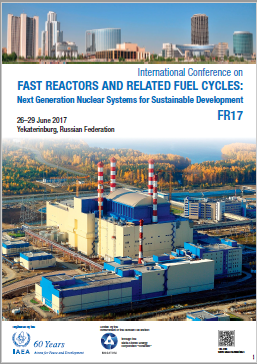Speaker
Mr
THEODORE COZZIKA
(CEA MARCOULE)
Description
French fast breeder nuclear plant PHENIX was definitively shut down in 2009. The dismantling preparations operations of some of PHENIX components are underway. Since 2008, CEA, EDF and AREVA have identified more than twenty relevant components of PHENIX, to get the most from the feedback of the components behavior.
Feedback regarding PHENIX components materials like austenitic stainless steels is large and valuable because some service sollicitations of base metal or welds are difficult to reproduce in laboratory.
In 2012, first examination have been performed on a rod made of SS 304L and SS 316L grades and exposed for about 70 000h to sodium at high temperature.
In this paper, we proposed to highlight the chemical compatibility with liquid sodium of the rod materials and compare it with the state of art on corrosion of austenitic SS (for structural components) in liquid sodium. Examinations (SEM, EDX, WDS) of the rod from PHENIX are the opportunity to improve the overall understanding of the coolant chemistry and its interactions with the materials, enabling easier operation of such reactor.
Finally, relevant data are obtained from this feedback for corrosion modeling for ASTRID fast reactor.
Country/Int. Organization
FRANCE / CEA (COMMISSARIAT A L'ENERGIE ATOMIQUE ET AUX ENERGIES ALTERNATIVES)EDF, Areva NP
Author
Mr
THEODORE COZZIKA
(CEA MARCOULE)
Co-authors
Dr
ANNE-MARIE ROUX
(CEA)
Mr
CEDRIC DAVID
(CEA)
Dr
CYRIL PUDOYER
(AREVA NP)
Dr
DIDIER VERNHET
(CEA)
Dr
EMMA PIOZIN
(CEA)
Dr
EMMANUEL EXCOFFIER
(CEA)
Dr
JEAN-LOUIS COUROUAU
(CEA)
Mr
JEAN-MICHEL AUGEM
(EDF)
Dr
LAETITIA NICOLAS
(CEA)
Mrs
Martine BLAT-YRIEIX
(EDF R&D MMC)
Ms
SOPHIE DUBIEZ-LEGOF
(AREVA NP)
Dr
VALERIE GRABON
(AREVA NP)
Dr
YVES LEJEAIL
(CEA)

